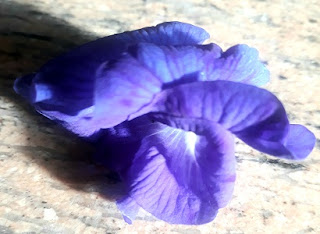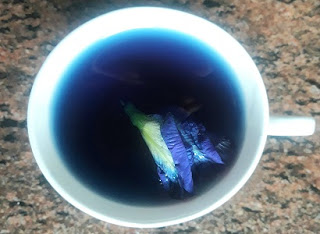Aparajitha in home remedies, memory booster
Aparajitha a flowering ornamental plant which has innumerable medicinal values. From its roots to flowers all the part of the plant is used in home remedies.This plant is called Butterfly pea in English. It is called Girikarnika in Sanskrit, Shanka Pushpa in Kannada, Aparajitha in Hindi, Sangu pushpam in Malayalam, Sanku pushpamu in Telugu and its scientific name is Clitoria ternatea.
It is native to Africa and it is widely available in South East Asia, South America and Australia.
Aparajitha plant is a vine and it needs support to climb and it also forms branches around it. There are different varieties of plants which flowers white, blue and light blue shades and also with single petal and double petal.
Aparajitha roots, flowers, leaves have antioxidant and antibacterial property. Due to these qualities of the plant, since ages people using Aparajitha in home remedies and it is also a good memory-booster.
Blue tea is prepared using blue flowers of Aparajitha which benefits a lot for our body.
This plant also helps in detoxification and cleansing of the nervous system of the brain.
Aparajitha in home remedies :
When you are suffering from migraine, Put 4 drops of juice in your nostrils, which is extracted from the roots of Aparajitha plant, which cures migraine.
Root paste is applied on the forehead to get relief from headache due to stress and anxiety.
The decoction prepared using matured roots of the plant relieves from frequent fever.
Its juice is a stimulant for brain and it is good brain tonic. It rejuvenates nerves and helps to overcome memory loss.
Aparajitha plant root decoction prepared with 4-5 black pepper and 2-3 tulsi leaves helps to get relief from cough.
Preparation of Aparajitha root decoction :
The decoction is prepared boiling one glass of water with plant roots, crushed black pepper and tulsi leaves till water reduces to half the amount.
Aparajitha plant leaves are boiled with water and this water is used to gargle to get relief from a throat infection. Leaf paste is applied on the neck.
Aparajitha plant seeds paste cures cough and stomach pain in children.
Its flower juice relieves from swelling and pain.
Its juice is used to wash wounds as it has an antibacterial property. The juice is regularly used as a mouth wash and it cures mouth ulcer.
Its juice also purifies the blood and it improves the blood circulation and in turn, helps in improving the health of the heart.
To treat heavy periods, Aparajitha leaves juice mixed with rock sugar is taken for a few days.
Aparajitha flower tea or blue tea :
You must try this blue tea, as the blue flowers of Aparajitha render an exotic blue colour to the tea, which has innumerable health benefits since it contains rich antioxidants.
Preparation :
Wash 7-8 blue flowers of Aparajitha. Soak the flowers in half a litre of water for half an hour. After that boil for a minute. You can have this with honey or sugar also.
Benefits of Aparajitha flower tea :
It relieves from anxiety and stress.
Blue tea helps to controls and maintains the sugar level in blood.
It is rich in antioxidants and it is anti-inflammatory.
It relieves cough, cold and other respiratory conditions.
This blue tea is a good herbal memory-booster.
Cultivation :
You can grow Aparajitha plant in a pot in your kitchen garden or terrace garden. Except for winter, in any other season, you can sow the seeds of Aparajitha. Aparajitha seeds germinate in 4-6 days.
After germination, it needs good sunlight. Monthly once manure should be supplied to the plant. As this plant is used in medicine, organic manure should be used.
It needs a good amount of water daily. The drainage system of the soil must be in good condition. As the plant grows it needs some support to climb as it is a vine.
In winter Aparajitha plant growth is affected due to less sunlight and cold. It's flowering also affected in winter. But after winter it grows well and starts flowering again.





Please do not enter any spam link in the comment box ConversionConversion EmoticonEmoticon